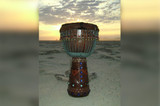Starting a Drum Circle
With spring in the air and summer right around the corner, outdoor activities are on the minds of people everywhere. Drum circles are great ways to not only enjoy the weather and soak up some sunlight, but they are an opportunity to join communities of people together in the pursuit of music and rhythm. A drum circle can benefit everyone, regardless of ability, age, gender or culture, but, starting one can be a daunting task even for the most experienced drummer or community organizer.
Drum circles are rarely spontaneous events that happen out of nowhere, there is a lot of planning that must happen in order for the activity to be a success. In fact, there are two necessary aspects of a drum circle in order to have a satisfying experience: drum circle instruments and a qualified and experienced drum circle facilitator. Without these, the drum circle can and will have less impact on the participants. With the work involved in organizing a drum circle, it is always best to have the proper tools and people in place to ensure a fun time for all.
Drum Circle Instruments: While each drum circle is a unique experience, the instruments involved should be a big consideration. Many of the participants who are familiar with drumming and percussion will likely bring their own drums, and possibly extra percussion instruments to share, but for others without the experience or means, having a supply of hand drums like djembes, bongos or cajon drums can definitely increase how the drum circle is involved. With a little research and dedication, a drum circle organizer can find “kits” and percussion packs that contain hand drums and other instruments like shakers, rattles, boomwhackers and more. A large variety of drums and percussion instruments will not only benefit the overall sound created during the circle, but, will allow those with limited ability, experience or shyness to participate on their own level.
Drum Circle Facilitator: Before hitting the first beat in a drum circle, it is important to understand that the leadership involved will define the overall experience for all participants. Drum circle facilitators should have experience with starting and ending the circle, as well as keeping the motivation and energy high throughout the rhythms played. If the drum circle organizer does not have the ability to lead the circle, then looking for a professional may be an option. Drum circle facilitators are skilled in all aspects of the circle, and can even bring vitality to the event that can carry forward into the next circle and beyond.
Starting a drum circle within a community or group or even for a festival, celebration or corporate event may take work, but the efforts will pay off in the end. By having the basic tools and people in place, the drumming event can not only provide a strengthening of ties, but could even foster further drumming events that spread the love and magic of rhythm.
Recent Posts
-
What is the Best Size Djembe for Beginners?
If you're new to the world of percussion and interested in learning the djembe, you're in for a t …16th Jul 2024 -
The Benefits of Becoming a Drumming Teacher: Transforming Passion into Profession
Why become a drumming teacher? Becoming a drumming teacher is an excellent way to share your pas …22nd May 2024 -
What Makes the Djembe Drum a Spiritual Instrument in African Music?
Origin and history of the Djembe drum The Djembe drum originates from West Africa and holds sign …16th May 2024




